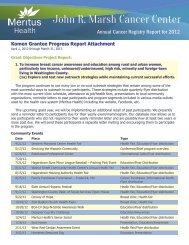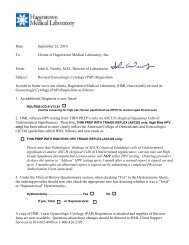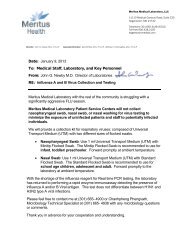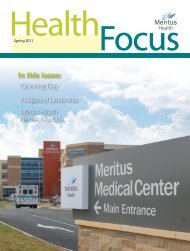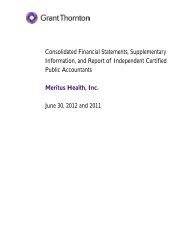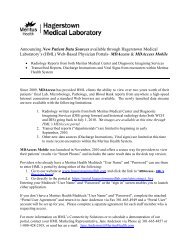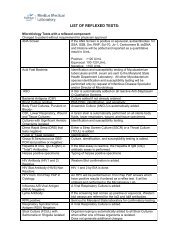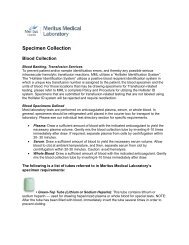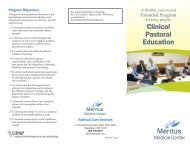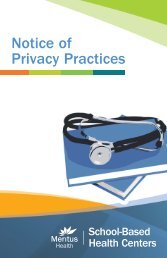Winter 2013 - Meritus Health
Winter 2013 - Meritus Health
Winter 2013 - Meritus Health
Create successful ePaper yourself
Turn your PDF publications into a flip-book with our unique Google optimized e-Paper software.
Medications andYour Hospital StayWhether it is a planned hip surgery or a sudden fall, an inpatient stay atthe hospital requires patients and healthcare providers to have acomprehensive understanding of the medications you take. Carrie Adams,Pharm.D, directory of pharmacy at <strong>Meritus</strong> Medical Center, explains whyfull disclosure, asking questions and medication management arenecessary for a safe hospital stay and trip home.Carrie Adams, Pharm.DBefore Being Admittedto the HospitalKeep your medications in theiroriginal containers. Why? The labelon the bottle specifies the drug name,required dosage, expiration date, originalprescription date and prescribing physician.If you use a pill organizer, use amedication form to record theprescription label information.* Keepthe form handy in case of a medicalemergency and provide a duplicatecopy to a close family member.Include over-the-counter pills likeherbal and dietary supplements on yourmedication form. A supplement such asSt. John’s Wort (used for anxiety andmood elevation) can cause a druginteraction according to Adams.*www.meritushealth.com/news/pdfdb/medInfoCard2011redesignblue.pdfIf your hospital visit is planned, talk toyour primary care physician andspecialist about whether you shouldcontinue to take your prescribedmedications while in the hospital.During HospitalizationBring a completed medication form ora bag containing your medications intheir original containers to the hospital.According to Adams, a nurse uses yourmedication list or bottled prescriptionsduring a process called “medicationreconciliation.” Once your currentprescriptions are recorded, the nurse willask a family member to take yourmedications home. “Using hospitalprovideddrugs lets us maintain theintegrity and quality of the medications,”commented Adams. Nurses andpharmacists see patients mixing differentpills in the same container or storingmedications improperly.Always ask the nurse what, why andhow when receiving a newmedication. “It’s perfectly okay to askyour nurse what does this drug do, howmuch do I need and how often do I needit,” explained Adams. Patients can also askthe nurse for a drug information sheet.For improved patient safety, <strong>Meritus</strong>Medical Center uses barcode scanning toverify that the medication, dosage anddrug delivery method matches thepatient’s wristband and the data enteredinto the pharmacy computer system.Assign a family member to help keeptrack of the medications you receivewhile in the hospital. Adams explainsthat patients are often drowsy, forgetfulor confused while hospitalized. Familymembers can ask whether any newmedications were started since the lasthospital visit.Upon DischargeUnderstand the care plan. “Whenpatients and family members understandthe patient’s care plan—includingprescribed meds—compliance is higherand there’s less chance of an emergencyroom visit or hospital readmission,”said Adams. “Patients feel morecomfortable with their medication whenthey understand the why and how andany monitoring requirements,”continued Adams.Report any adverse drug effects toyour primary care physician right away.Refer to your prescription label forpossible symptoms. Some signs of druginteractions include (but are not limitedto) difficulty breathing, dizziness, itching,abdominal pain, skin rashes andsun sensitivity.<strong>Meritus</strong><strong>Health</strong>.com 7



